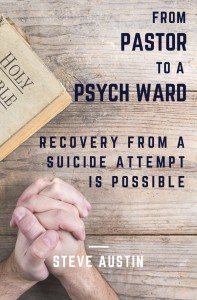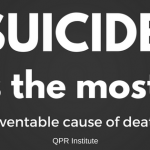My wife spent a week on a psych ward following the birth of our first son. She had a miserable fight with postpartum depression and sleep deprivation. One year later, nearly to the day, I landed in ICU and then a psych ward following a suicide attempt.

Shortly after, our marriage nearly fell apart. She left for two weeks, and they were the saddest and scariest days of my life. Once she came home, we started intense marriage and individual therapy, laying all our cards on the table. It was now or never. Eventually, we both decided to stay, fully aware of what that meant.
The dust has settled on that hard season, and thankfully, our “crazy” mostly shows up on different days. I am not a professional therapist, but I have been both the one who needed support, and the one who was asked to support a struggling spouse. I am writing only from my own experience.
After living through it, here’s 6 ways to survive marriage and mental health:
1) Don’t just hope for the best. Do something.
When a friend confesses their marriage is unraveling, I immediately tell them, “Counseling saved our marriage and quite possibly my life.” The vast majority of the time, that statement is met with, “He would never go for that,” or “I’ll be praying about how to best approach that subject with her.”
Most folks do not like the idea of airing their dirty laundry to a complete stranger. I get it. Me too. All I can tell you is after walking through it, I am a firm believer in the safety and stability of talking with a legit professional on a consistent basis.
2) Stop trying to fix your spouse.
I am not my wife’s therapist and she isn’t mine. While we play a primary role in each other’s support systems, we are not professional helpers.
On the days when Lindsey comes home and finds the fog of depression lying low on the living room couch, she has learned to just say, “I’m sorry you’re having a tough day. I’m here if you need me.” It is not healthy for either of us personally, or for our marriage, for her to do any more than that. It isn’t her job to try and fix me or convince me that she’s going to be there for me. After all, she proves that by staying.
3) Talk about it with each other.
There is great power in being able to tell our stories, either to our partner, a counselor, or a trusted friend. Being able to name our pain, our struggles and frustrations, and even our greatest hopes is a catalyst toward true change.
There is a conventional wisdom that says not to go to bed angry. I disagree. Sometimes you go to bed with a hurt heart, with the full intention of waking up and talking about it once things settle down.
4) Know your limits.
In the Christian circles where I grew up, I often heard, “Stay because marriage is a sacred bond.” Or “God hates divorce.” In other circles, it seems just the opposite: that feelings trump commitment and if you aren’t happy, you are entitled to simply walk away, no questions asked.
I can no longer accept either approach as the only option. Each marriage is unique, especially where mental illness is concerned. You have to take a serious look at your situation, self, and sanity. Decide what is best for you, your spouse, and your children, if you have them. Sometimes the best way to love and honor everyone involved is to leave.
I don’t believe “When you have done all you can do, stand” is always the best advice. To the one suffering in silence with a mentally ill spouse, this kind of advice can feel like a death sentence. I have seen firsthand that separation or divorce is sometimes the next right step, and can breathe peace into a family.
5) Love beyond the labels.
The spouse of someone with a mental illness often suffers in silence. When your spouse can’t explain “why” normal life feels so hard, it is frustrating. We know their labels, we’ve read all about their symptoms. Labels are important from a medical standpoint, because they show professionals the best course of treatment. But labels in marriage are detrimental. Don’t become so stuck on them that you forget to love the person you married.
6) No more comparisons.
One of my favorite quotes by Brennan Manning says, “You can’t compare your insides with everyone else’s outsides.” Nobody has the perfect marriage. Let go of what you think it is supposed to be, and live in the relationship you actually have. Stop trying to have your friend’s marriage or mimic your parent’s relationship. Nobody has the magical romance they portray on Facebook, so shut that noise off.
If you are married to someone in danger, someone whose struggles make them a danger to themselves or others, here are some resources:
- Postpartum Depression: 1(800) PPD-MOMS
- National Suicide Prevention Hotline: 1 (800) 273-8255
- National Alliance on Mental Illness
 Get your copy of my brand-new book, “From Pastor to a Psych Ward: Recovery from a Suicide Attempt is Possible” today on Amazon for only $2.99!
Get your copy of my brand-new book, “From Pastor to a Psych Ward: Recovery from a Suicide Attempt is Possible” today on Amazon for only $2.99!
*To read the original 11 Tips on Marriage and Mental Health on Morgan Guyton’s blog, just click here.












